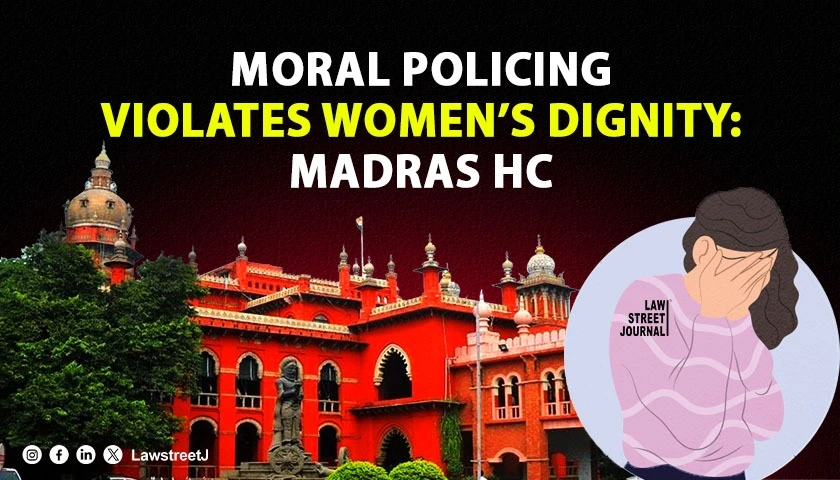Madras: The Madras High Court has delivered a significant judgment addressing the dangerous practice of moral policing, emphasizing that such vigilante acts infringe upon constitutional rights and disproportionately affect women in rural societies, while modifying bail conditions to serve as a deterrent.
Justice L. Victoria Gowri made crucial observations on the intersection of personal liberty, women’s dignity, and the menace of moral policing in the context of a tragic suicide case.
The court was hearing Criminal Revision Case (MD) No. 582 of 2025, filed by the de facto complainant, challenging the order dated 19.03.2025 passed by the Principal Sessions Judge, Theni, which dismissed her petition seeking cancellation of bail granted to the accused.
Addressing the tragic circumstances of the case, the court observed, “The case was initially registered under Section 194(3) of the Bharatiya Nyaya Sanhita, 2023 (relating to suspicious death) on account of the death of the complainant’s daughter by hanging. During the investigation, it was revealed that the accused, Arun Kumar, had locked the door of the deceased’s house from outside while she was inside conversing with one Ramkumar, when her husband was away for work in Kerala.”
The court highlighted the devastating consequences of moral policing, stating, “The incident allegedly gave rise to rumours of an illicit relationship between the deceased and Ramkumar, which, in turn, brought dishonour and disgrace upon her in the eyes of the villagers. Unable to bear the humiliation, the deceased committed suicide.”
In a critical observation about the practice of moral policing, the court stated, “This Court cannot be oblivious to the dangerous and regressive practice of moral policing, which has no sanction in law. Women, particularly in rural societies, are the worst victims of such vigilante acts. Such behaviour not only infringes Article 21 of the Constitution, guaranteeing dignity and liberty, but also contributes to social ostracization and, in cases like the present one, pushes victims towards tragic ends.”
The court emphasized constitutional protections for women’s dignity, noting that “the dignity of women is constitutionally protected under Article 21 of the Constitution of India, which guarantees the right to life and personal liberty, encompassing the right to live with dignity and without social humiliation. Acts of moral policing, particularly targeting women, amount to a direct assault on this constitutional guarantee.”
Regarding international obligations, the court observed, “India, being a signatory to the Convention on the Elimination of All Forms of Discrimination Against Women (CEDAW), is bound to ensure that women are not subjected to gender-based discrimination, stigma, or social violence. Similarly, Article 17 of the International Covenant on Civil and Political Rights (ICCPR) protects every individual against arbitrary interference with privacy, honour, and reputation.”
The court referenced the Supreme Court’s condemnation of vigilante acts, stating, “The Supreme Court has condemned acts of self-appointed vigilantes interfering with personal liberties in Shakti Vahini v. Union of India.”
Balancing the rights of the accused with societal interests, the court observed, “While the learned Sessions Judge has not found grounds to cancel bail, I am of the view that the conditions of bail must be further strengthened and strictly monitored. This approach balances the rights of the accused under Article 21 (personal liberty) with the societal interest in preventing misuse of bail and deterring moral policing.”
In its final directive, the court stated, “Though I find no infirmity warranting cancellation of bail, I direct that the condition imposed by the Trial Court requiring the accused to report to the respondent police twice daily at 10:00 a.m. and 5:00 p.m. shall continue for a further period of one year. This prolonged compliance is intended to instil discipline and to serve as a deterrent against further acts of moral policing.”
The court further emphasized that the Supreme Court has consistently held that cancellation of bail must be justified by supervening circumstances, misuse of liberty, or manifest perversity in the grant of bail.
Mr. J. Yogeswaran appeared as counsel for the petitioner, Mr. M. Sakthi Kumar, Government Advocate (Criminal Side), appeared for the State of Tamil Nadu, and Mr. D. Saravanan appeared for the accused.
Case Title: Navanitha vs. State of Tamil Nadu and Others




![TN Medical Council declares change of gender identity of LGBTQIA+ as misconduct [Read Notification]](/secure/uploads/2022/12/lj_5268_5cebb05a-97fb-40fb-8045-25cdf8f4207a.jpg)
![Madras High Court Directs Tamil Nadu Government to Ensure Quota for Transgenders in Local Body Elections [Read Order]](/secure/uploads/2023/08/lj_2507_7a03d113-08b1-4670-b6fb-9058aee481d0.jpg)
![Anti Corruption sleuths acted like "puppets in The Muppet Show", HC notice to ex TN CM in disproportionate assets case [Read Order]](/secure/uploads/2023/09/lj_8675_7b37fc02-1b2d-4f4a-9816-3df20545b37e.jpg)






